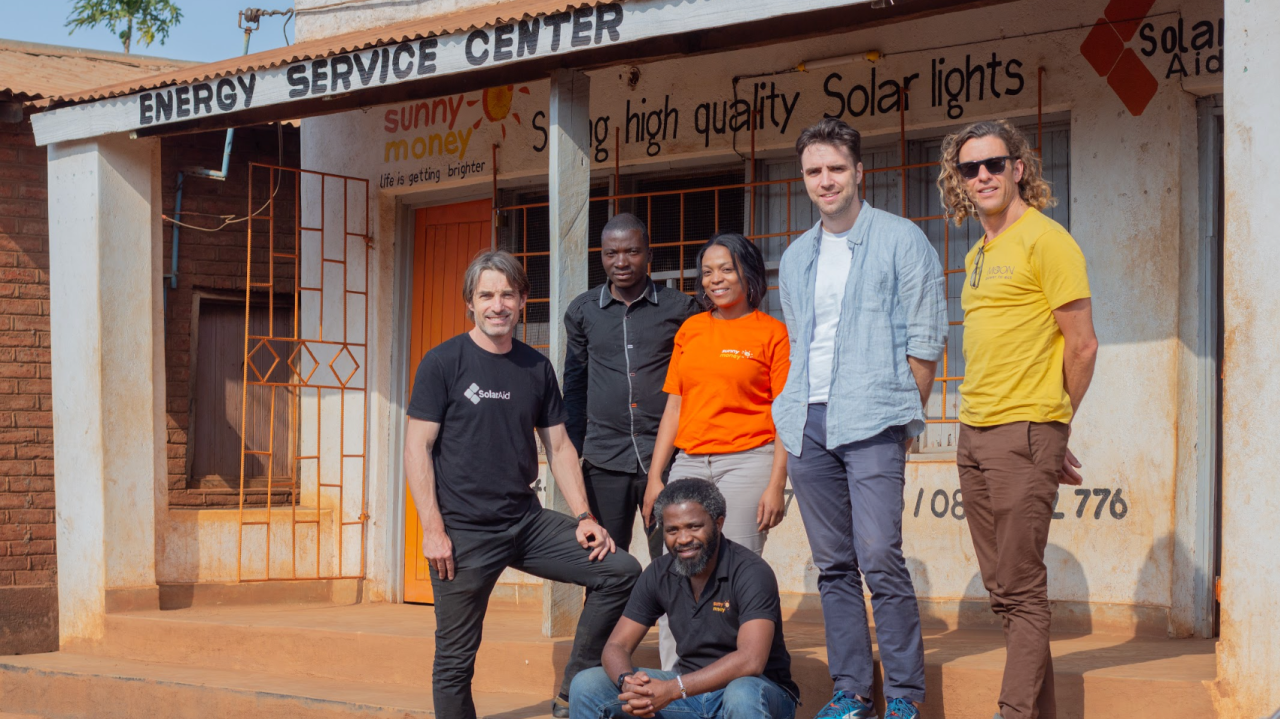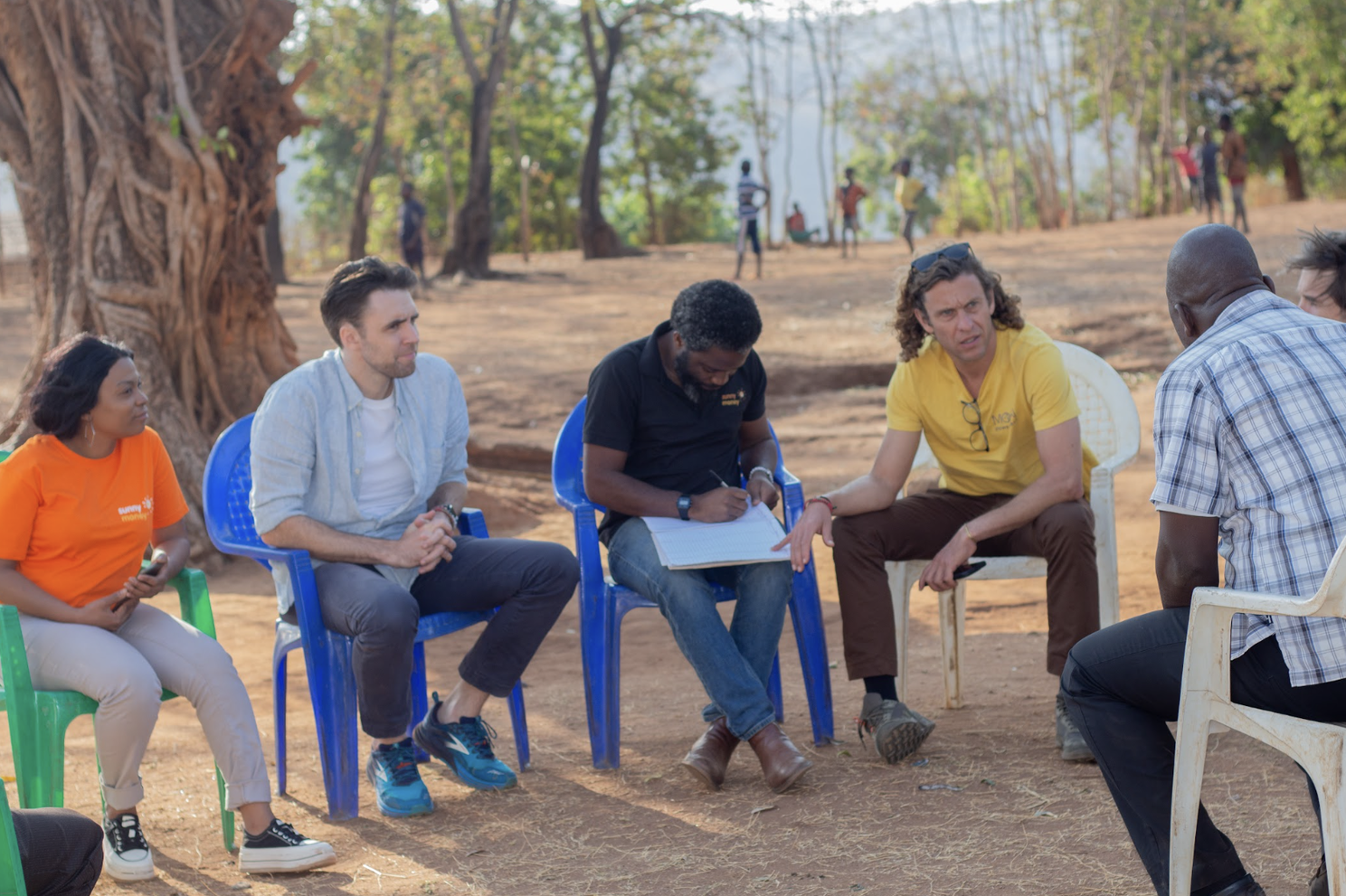REAL Talk: Inside the Rural Energy Access Lab’s mission to connect the last mile
REAL co-founders, with Sunny Money and SolarAid team members in Kasakula, Malawi.
Rural Energy Access Lab (REAL) Founders on what brought them together to create REAL, the barriers facing universal energy access and what game-changing action looks like in practice.
Drawing on their decades of collective experience, John Keane, (SolarAid CEO), Thomas SAMUEL (MOON CEO) and Alexandre Tourre (Easy Solar CEO) shared candid insights into where current models are reaching geographical and financing limits and how REAL is working to overcome those barriers.
Q: How has your experience in energy access led you to come together to create REAL?
John Keane, SolarAid (JK): Over the past decade, we’ve seen a significant increase in solar products across Sub-Saharan Africa. That’s the good news. But despite this progress, solar companies, especially those using the pay-as-you-go (PAYGo) model, are struggling to operate sustainably.
“The poorest communities are still being left behind, and the sector has stalled in terms of ideas and momentum. Everyone talks about leaving no one behind, but we’re not yet seeing enough practical action that actually targets the most underserved.”
Thomas Samuel, MOON (TS): I started my journey in 2017, launching a PAYGo business in southern Senegal. While the ambition to leapfrog traditional infrastructure with private-sector-driven models was inspiring, the reality was different. In the worst cases, we lost systems, we lost trust from our agents, staff, and customers. Because this model requires expertise in credit scoring and operational excellence that’s out of reach for many entrepreneurs in this space. That’s when I began rethinking the model and shifted toward a service-based approach to energy delivery.
Alexandre Tourre, Easy Solar (AT): I co-founded a PAYGo company about nine years ago, focused on smaller markets in West Africa. Initially, the excitement around SDG 7 and universal energy access was high. But over time, industry conversations shifted from energy access and more toward micro-finance. I heard much more discussion about how to find credit-worthy customers and boost loan sizes. The sector matured, yes, but moved away from its foundational goal.
“If the current model was really capable of delivering universal access, we wouldn’t still be talking about how to reach the last mile.”
REAL co-founders Alex Tourre, (second from left) and Thomas Samuel (second from right) consulting visiting REAL's pilot project with SolarAid in Kasakula, Malawi.
Q: So what exactly is REAL, and what are its aims?
AT: REAL was born from the recognition that the current market-based model cannot scale to achieve SDG 7. It's not an opposition to existing models, but rather a complement. REAL is about accepting the limitations of what’s out there and creating sustainable practical alternatives that work for the hardest-to-reach communities. We're focused on affordability, speed, and sustainability—and on making good use of public funds.
JK: The sector keeps calling for game-changing action. REAL is our answer to that. We have decades of experience, and are unafraid to ask hard questions and learn by doing. It’s unfair to expect last-mile distributors to solve some of the toughest development problems alone. REAL is a collective effort to demonstrate scalable, real-world solutions.
TS: Our ambition is to work with governments to accelerate their electrification strategies. Today, electrification largely relies on grid extension and mini-grids—both capital-intensive and slow to deploy.
“REAL wants to leapfrog delays by rolling out large-scale, pre-grid electrification programs that can bring solar home systems to every household quickly. We aim to help at least 10 countries reach universal access by 2030.”
REAL members Thomas Samuel (Moon) and Brave Mhonie (SunnyMonney/ SolarAid) speaking at GOGSFE24.
Q: What are the foundational principles that define REAL’s model?
AT: For us, it comes down to three key principles: affordability, our model puts energy within reach for 90–95% of rural households. Sustainability: systems must work over the long term, not just be sold, but maintained and serviced, and Speed. time is of the essence. We need projects that can scale rapidly and reliably.
“We also need to redefine what we mean by a “connection.” REAL considers long-term, maintained access as the real metric of success, not just a solar system sold. ”
We work with Tier 1 solar systems because they’re the only infrastructure today that allows even the poorest users to cover ongoing operational costs through the Energy-as-a-Service model.
AT: Another shift we’re making is to move away from selling solar systems one at a time. We’re applying infrastructure project development principles to pre-grid electrification and aiming to install hundreds of thousands of systems in months, not years.
Q: Some might view REAL’s model as disruptive. What would you say to PAYGo companies or mini-grid operators?
JK: We’re not looking to displace anyone. REAL is targeting the places no one else is reaching. That’s not a threat, it’s an opportunity. Experienced operators struggling with unsustainable models could pivot and help deliver this one.
AT: I run a PAYGo business myself. I can say both models can coexist. REAL reaches the people PAYGo never will. Not because PAYGo isn’t attempting to, but because its model is fundamentally based on credit. If people can’t qualify for loans, even $50 ones, they’re excluded. That’s the reality.
TS: For mini-grid companies, we’re allies. Our model helps them reach customers who can’t afford kilowatt-hour pricing, we complement, not compete. In fact, we’ve already partnered with mini-grid operators to deliver hybrid electrification solutions that lower CapEx and improve profitability.
What’s Next?
REAL’s founders will return in part two to share the latest announcements on scaling their model, forging new partnerships, and advocating for policy and financial reforms that will help rapidly bring energy access to all.



